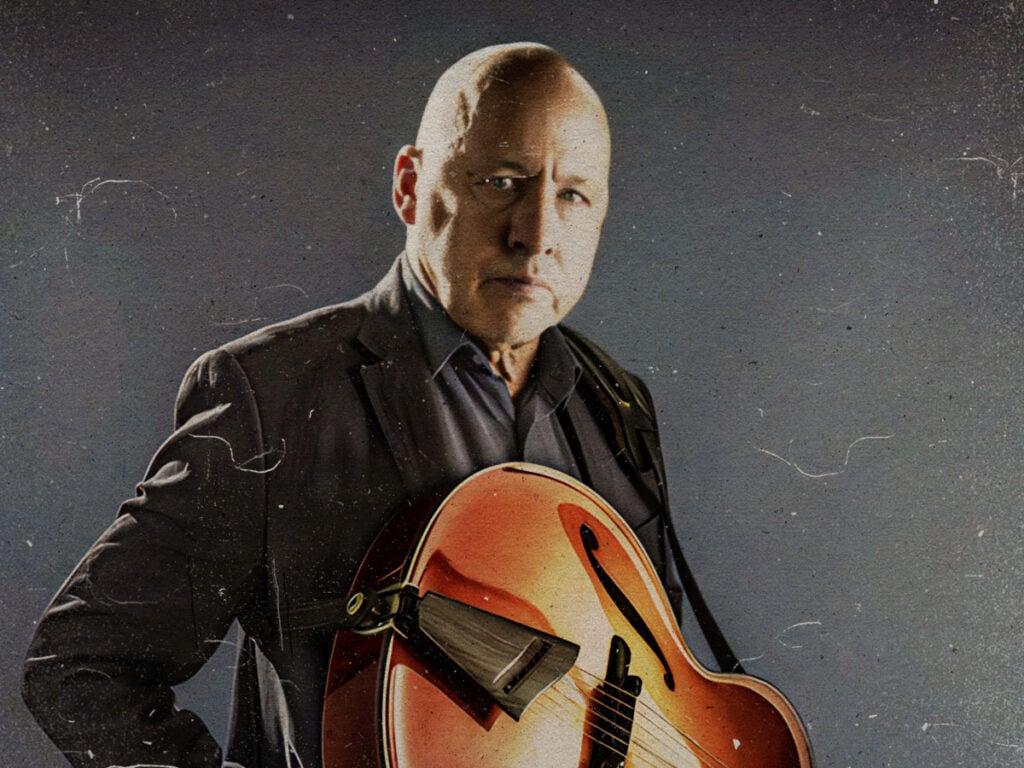Mark Knopfler on why David Gilmour is a unique talent
 Posted On
Posted On
(Credits: Far Out / YouTube Still / Anton Corbijn)
In the pantheon of guitar talent, it can be difficult to rank at the ceiling. Most guitarists seem to agree that Jimi Hendrix is the greatest electric guitarist of all time due to his imaginative psychedelic rock stylings, which influenced the masses with unique tone and compositional complexity. David Gilmour is also considered by many as an all-time great, but for very different reasons.
In 1967, just after the arrival of their debut album, The Piper at the Gates of Dawn, Pink Floyd’s founding leader and guitarist Syd Barrett entered a mental health spiral. To alleviate the troubled musician’s impact on the band’s touring commitments and studio work, Pink Floyd brought in Barrett’s childhood friend, Gilmour.
Though the band knew Gilmour, they had several options to choose from. Fortunately, their acquaintance was the perfect option as a guitarist who had learned by replicating his heroes, from Lead Belly to Hank Marvin. This method made Gilmour an exceptional guitar actor. While taking over from Barrett in the A Saucerful of Secrets sessions, he could reproduce Barrett’s idiosyncrasies resoundingly.
Sadly, Barrett’s days in Pink Floyd were numbered. He became increasingly unreliable and made limited contributions to A Saucerful of Secrets, thus necessitating expulsion in 1968. After Barrett’s departure, Gilmour began to establish a style of his own, which gradually migrated Pink Floyd’s sound from the kaleidoscopic carousel of the early years to the expansive, anthemic pastures of the early 1970s.
In classic early 1970s albums like Meddle and The Dark Side of the Moon, Gilmour displayed an eclectic approach with the bouncy blues of ‘Money’ and the breezy acoustics of ‘San Tropez’. However, the most memorable tracks, like ‘Echoes’ and ‘Breathe (In The Air)’, brought a brooding, atmospheric sound that valued tone and melodic intricacy over speed.
The misconception that speed is always better or more impressive in guitar playing has often seen Gilmour sidelined in favour of Eddie Van Halen or Jimmy Page. On several occasions, Gilmour has lamented his inability to keep up with Van Halen’s pace, but one must always play to their personal strengths.

Among the notable guitarists who have recognised Gilmour’s unique talent is Dire Straits’ Mark Knopfler. Though the ‘Sultans of Swing’ singer knows how to impress with speedy blues, he appreciates Gilmour’s tone and his astonishing compositional strengths. “I like its intonation; there is always a side ‘swamp’, bluesy, in the sound of his Stratocaster,” Knopfler told French Guitarist in 2002. “But also a crystalline quality at the same time, which corresponds more to my personal sound.”
After observing Gilmour’s pin-drop clarity, Knopfler addressed the Pink Floyd guitarist’s compositional grasp. “What I also like about Dave is the way he plays while wandering around the central melody, which he rarely approaches in a frontal way,” he added. “It is the mark of a great guitarist.”
In return, Gilmour has, for many years, admired Knopfler’s accuracy at speed. “Mark Knopfler has a lovely, refreshing guitar style,” he said. “He brought back something that seemed to have gone astray in guitar playing.” Gilmour seemed to appreciate Knopfler’s shared appreciation of a traditionally clean style attributable to their shared hero, Hank Marvin.
Finally, Gilmour reflected on his tendency to emulate his heroes earlier in his career. “These days, I don’t listen to other people with the objective of trying to steal their licks,” he admitted. “Although I’ve got no objections to stealing them if that seems like a good idea. I’m sure that I’m still influenced by Mark Knopfler and Eddie Van Halen as well.”
[embedded content]


